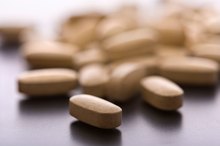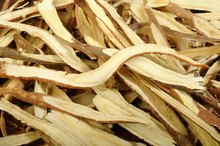Gallbladder & Liver Supplements
Your gallbladder and liver are two unique organs that perform numerous functions. Your gallbladder is a small, hollow organ that helps your digestive processes and stores bile. Your liver, notes MayoClinic.com, also helps you digest food as well as absorb nutrients and sequester and eliminate toxic substances from your body. Gallbladder and liver supplements may help improve the functions of these organs. However, supplements should always be used under the care of a licensed healthcare provider.
If you are experiencing serious medical symptoms, seek emergency treatment immediately.
Gallbladder and Liver Problems
There are many gallbladder and liver problems that can arise. Possible liver problems include:
- fatty liver
- viral hepatitis
- alcoholic hepatitis
- enlarged liver
- liver failure
- alpha-1-antitrypsin deficiency
- liver cancer
- parasitic infections of your liver
Abdominal pain or discomfort may be one of the most common symptoms associated with gallbladder and liver conditions.
Helpful Supplements
Supplements for Gallbladder Removal
Learn More
More research evidence may be required to determine these supplements' health benefits.
A Commonly Used Supplement
Celandine may be one of the most commonly used nutritional supplements in treating both gallbladder and liver problems or dysfunction. This supplement may be used in treating chronic liver and gallbladder diseases, notes Tilgner.
Considerations
How to Use Serrapeptase
Learn More
Gallbladder and liver problems should always be managed by a qualified and competent healthcare professional. Before ingesting dietary supplements to help improve your gallbladder or liver function, speak with a clinical nutrition expert about what supplements may be most appropriate for you and your health problems. Avoid using dietary supplements in place of other treatments prescribed by your primary care provider, and always ask your doctor about appropriate dosage and potential drug interactions before using supplements.
- Gallbladder and liver problems should always be managed by a qualified and competent healthcare professional.
- Avoid using dietary supplements in place of other treatments prescribed by your primary care provider, and always ask your doctor about appropriate dosage and potential drug interactions before using supplements.
Related Articles
References
- University of Maryland Medical Center: Gallstones and Gallbladder Disease
- "Therapeutic Herb Manual"; Ed Smith; 2007
- "Herbal Medicine From the Heart of the Earth"; Sharol Tilgner, N.D.; 1999
- Gallstones. National Digestive Diseases Information Clearinghouse (NDDIC).
- Njeze GE. Gallstones. Niger J Surg. 2013;19(2):49-55. doi:10.4103/1117-6806.119236
- Guclu, M., et.al. Ultrasonographic evaluation of gallbladder functions in patients with irritable bowel syndrome. Journal of Gastroenterology and Hepatology 2006 21:1309-1312. doi:10.1111/j.1440-1746.2006.04136.x
- Lee, O. Asian motility studies in irritable bowel syndrome. Journal of Neurogastroenterology and Motility 210 16:120-130. doi:10.5056/jnm.2010.16.2.120
- "Gallstones and gallbladder disease - Symptoms" University of Maryland Medical Center.
- Misra, S., et.al. Gallbladder Dynamics in Patients with Irritable Bowel Syndrome and Essential Dyspepsia. Journal of Clinical Gastroenterology 1991 13:65-68. doi:10.1097/00004836-199102000-00014
- Njeze GE. Gallstones. Niger J Surg. 2013;19(2):49-55. doi:10.4103/1117-6806.119236
- Sood, G., et.al. "Abnormal Gallbladder Function in Patients with Irritable Bowel Syndrome." American Journal of Gastroenterology 1993 88:1387-1390.
Writer Bio
Martin Hughes is a chiropractic physician, health writer and the co-owner of a website devoted to natural footgear. He writes about health, fitness, diet and lifestyle. Hughes earned his Bachelor of Science in kinesiology at the University of Waterloo and his doctoral degree from Western States Chiropractic College in Portland, Ore.









